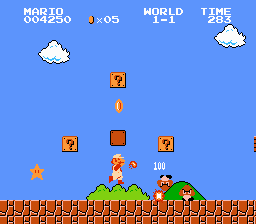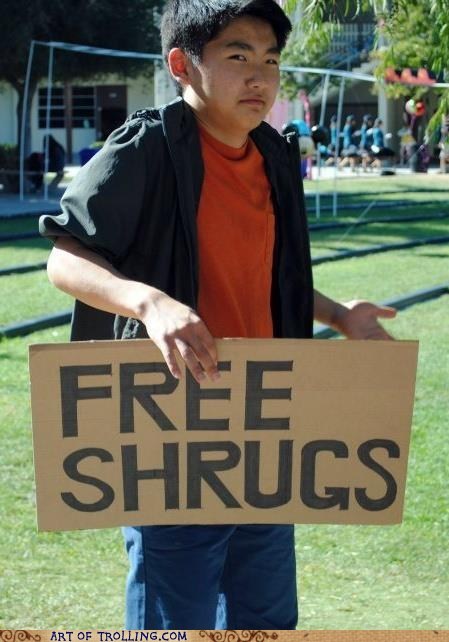To be fair, I gave this game about an hour or more of
playtime, in the spirit of this new feature here on Scattergamed. This should have been a five-minute review,
since I wanted to shut off my Xbox in disgust that soon into it.
But let's begin at the beginning, with a cute little opening
involving a chicken.
 |
| D'aww. |
The chicken, while certainly engaging in a Disney sort of
way, was a little too distracting, since I didn't pay much attention to the
voiceover, which is the thing I should
have been paying attention to from the get-go.
After the intro, I find my character in bed, with John
Cleese trying to wake me up. That is a
seriously poor choice for voice acting -- not that I don't like John Cleese; I
enjoyed him in plenty of movies -- but it's that I recognized his voice so
quickly that I could no longer view him as the servant, just John Cleese.
I'm going on an adventure with Basil Fawlty. Lovely.
Using big name actors to voice your game is fine, but if
you're going to do it, do it right. Linda
Hunt as the narrator of God of War worked; Michael Clarke Duncan as Atlas did
not.
It's a fine line between clever and pushy with voice acting
in games. You should use voices that are
"those guys" -- actors with voices that are recognizable, but not so
recognizable that all you can think of is a role they played.
Next, I got used to the controls, a little annoyed by them
but figured I'd get used to them soon enough; after all, Shadow of the Colossus
was hard to get used to, but it was a great game.
The little fairy dust that led me around in the beginning
was a cute little tutorial touch, but once I got ten minutes into the game I
started to get really annoyed that it wouldn't go away.
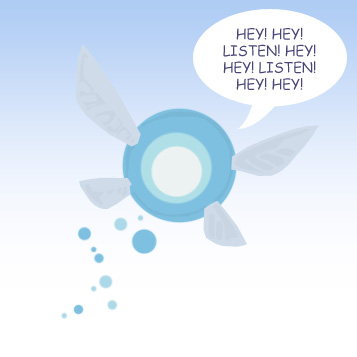 |
| Somewhere around this level of annoyance. |
I understood that I was being led by the nose at first, so I
could get used to fighting, pulling people, talking, zooming in on conversations,
etc., so I gave the game some slack until I finished the tutorial stage. As far as tutorials go, it was mediocre, but
I shrugged and moved on. I was sure that
the story would pull me in soon to move me along while they showed me the
controls.
And then the story really started, and it pushed me away
farther than I thought you could push a person.
First, your brother is evil for the sake of being evil; he
was a villain because the game needed a villain. He looked like a villain, talked like a
villain, and acted like a villain. Dr.
Evil was more subtle than this guy.
And that's when I discovered that Fable III follows the
"Game of Thrones" method of plot contrivance: give someone two choices when there is an
obvious third choice.
Now, here I am as the main character; they want me, the player, to take the role of the
Prince. They don't even name him, just
so I can pretend it's me (although there is no character customization at the
beginning beyond male/female and two sets of clothes so he looks nothing like
me). So I should be able to make the
choices I would have thought of in that circumstance.
The King decides to kill a bunch of rioting commoners, and
the player character steps in. The King
decides, on an evil whim, to have the player character make the choice between
killing the rioting commoners or killing a girl who is his friend (who I
suppose has been his friend for years).
 |
| Evil people have soul patches, you know. |
Now, I will accept awful characterization because the
writers just want to hit you in the gut with a 100% pure evil villain, no
polyester. But I will not accept being
forced to make a choice because the mechanics,
not the story, said I had to.
By this I mean that, when I was told to choose between my
friend and the commoners, the only two options that appeared on screen were
those, yet in the actual scene, everything, and I mean everything was set up for me to punch my brother in the face.
Everyone in the room was on my side, knowing my brother was
evil, no one was holding my hands behind my back, no one was threatening my own
life, no one would have stopped me if I killed my brother and declared myself
King.
I should have been able to.
If any one of those factors in the scene were changed, I
would have accepted my fate and picked between the commoners or my friend; if I
was handcuffed, or there was a knife to my throat, or if the guards and others
in the room were on my brother's side, then it would make sense that I couldn't
choose to just attack him.
Hell, I would have accepted being given the option, then
getting killed immediately, then being told to start again. It would have been a dick move, but it would
not have been in any way as dickish as the convoluted choice they gave me.
So I picked my friend to be killed since that was the
obviously good choice, both in numbers and by the will of my friend (she said
she was okay with dying to save them), so it was hardly a choice at all.
The lack of subtlety was astounding. This is a variation of the classic 24 dilemma: terrorists are about bomb a mall and kill 300
people. If you stop them, you won't stop
their next attack which will kill 1000 people.
If you let them kill the 300 now, you can prevent them from killing 1000
later. What do you do?
But with that dilemma, you're faced with 300 people in the
moment vs. 1000 hypothetical people later, and it's the time factor that is
what makes it a dilemma.
There is no dilemma here.
Either save 20+ people or save 1.
The fact that one is your friend and the 20+ are commoners means nothing
to me at all, because I, as a player, have not developed any kind of
relationship with the friend. I hugged
her, led her by the hand around the castle, and let her die. That is the extent of my relationship.
I'm sure the protagonist has a years-long relationship with
the woman, but I don't, so I don't
care.
Besides that, if I were real royalty, the fact that the 20+
were commoners should have made a difference (being that, to royalty, a common
life is not worth as much as a royal life), but since I, the player, am
distinctly not royalty, and I haven't
been playing the game long enough to roleplay properly, the fact that they are
commoners changes nothing.
 |
| There is always a job for the peasants in my castle. Like target practice. |
So I was given this choice, and the buttons even floated on
the screen telling me what to push. I
pressed other buttons; I tried moving a stick; but my character would not move,
as if he suddenly was in a sticky floor emporium.
This is the reason I wanted to shut the game off in the
first five minutes. It's like reading a
choose-your-own-adventure book and being presented with the choices of "If
you would like to jump off a cliff, turn to page 12. If you would like to slit your wrists, turn
to page 58."
What kind of a choice are you giving me? The third option in the 1 vs. 20+ scenario is
"attack the King". I just learned how to swordfight! My assumption was attacking him was what I
was supposed to do from the start; there was no way they would teach me to
swordfight and then not let me swordfight.
That's like teaching me Tae Kwon Do and then throwing me in an MMA fight
but arbitrarily telling me "No Tae Kwon Do."
But no, attacking the King doesn't work because the normal melee
attack button is being used as one of the two choices!
But enough of this nonsense.
I decided to just kill my friend and be done with it; everyone seemed to
agree with it, so whatever. Albion has wacky morality rules.
 |
| We have reached critical wackiness. |
The game couldn't save itself from this, but I decided to
play further anyway, just to be a nice reviewer.
The rest of the game just annoyed me further. Context-sensitive buttons were silly, like
how sometimes I just had to press the A button, and other times I had to press
and hold it, though there was no specific reason for either.
It's like they were trying for that God of War control
scheme where sometimes you have to hold the button to open something, and other
times you have to tap it repeatedly. But
in God of War it makes logical sense depending on what the object is you're
interacting with, and feels natural; in Fable III, the choice is random.
Next I got sent into sewers.
Sewers.
So now I want to shut off the game twice in ten minutes.
How many games have you played with sewer levels? A hundred?
One-fifty? And how many of them
had good sewer levels? Zero.
But let's grade on a curve here. Excusing the fact that it's a sewer level, it
didn't act very much like sewers, like it was Sewers-In-Name-Only. It seemed more like a lost city, or an
underground temple, which actually would have been a great idea if they had
just called it that from the start.
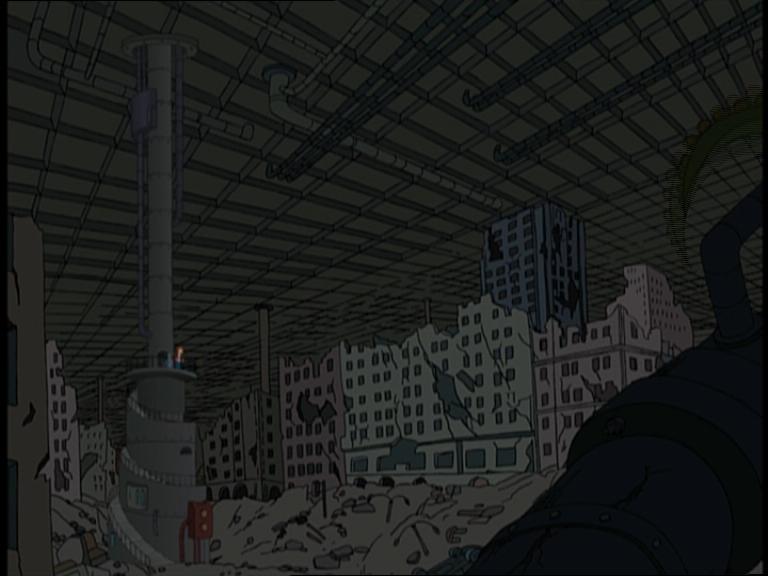 |
| Only a sewer if you live above ground. |
Once in the sewers, the fairy dust really seemed like the
level designers' apology for making bad levels, and they didn't need it,
because the level design was decent in the first place. It was linear with little divots for treasure
chests, so there was no need for the fairy dust at all.
In fact, there was no need for the dog, either. The dog barks when there is treasure nearby,
but I would have enjoyed the level much more if there was no dog and no dust,
so I could just explore and discover the niches of the level myself.
I was starting to think "Really? I'm still in tutorial mode? At what point will they stop with the fairy
dust?" But this continues for as
long as I played, even after they supposedly started giving me free reign to
run around on my own.
One other nitpick to mention is that you occasionally have
to dig, and when you do, you don't use your hands, you use a shovel which you
apparently keep in your pocket for just such occasions. Screw Disney, this is Bugs Bunny territory
now.
And then I got attacked by bats.
Bats.
How does one kill bats?
Naturally, with fireballs!
Moving on, I got to run into some skeleton warriors before
leaving the sewers as well, and it was at these fights when I started to
realize I had no health bar.
I think their
substitute for a health bar is a heart beat and red around the edges of the
screen, which would be fine if this were a game that was trying to appear
cinematic. Well, they probably were trying, but just failed. Since I stopped caring about the plot a while
ago, I was just trying to learn the mechanics and hope to have fun with the
action. In that case, a health bar would
have been nice.
Eventually I discovered the old war room the protagonist's
father once used, and Basil cleaned the cobwebs and taught me how to use a
firearm and whatnot.
I realized the war room, being taken there through the start
button, was basically an elaborate pause menu.
It wasn't awful--certainly no more so than any other design
decision--but it did make me roll my eyes.
Similarly, the Road to Heroism or whatever it's called is
basically a way to upgrade stuff. I
decided I didn't like the ranged weapons or the magic (and I usually don't in
RPGs, being primarily a tank), so I decided to just upgrade my hammer and go
full Thor.
This did not work out, especially when I entered the mercenary
camp, but I'll get there.
There were also a few cosmetic customization options, such
as being able to dye my hair, which would have been nice from the very beginning.
This is a similar problem I had with Tony Hawk's American
Wasteland. Most Tony Hawk games allowed
you to customize your character from the beginning, but THAW had you pick a
basic body type and skin color, then had you work to earn customization.
Sorry, Tony, but I don't normally have an afro, and it would
have been nice if I could have been myself from the start, rather than being
given a character and mocking him up to look like me.
This is a subtle but strikingly big psychological flaw in
games featuring customization. I will
accept that I cannot customize my character; if I am playing Jack Sparrow, he
will look like Jack Sparrow. But to have
me play one character and let me change his look later both breaks the flow of
the game and is pointless. Since the
character isn't my own creation in the first place, why should I care about
customizing him further?
Now, when I finally got out of the sewers and got to a cold
little town, I had to buy some clothes to blend in and warm up, which was cute,
and I didn't mind, since it was just clothes.
I did find it odd that in such a cold place I had exposed
skin; as did the elders and, well, mostly everyone. If it's so cold, why am I wearing short
sleeves?
At this point, I ought to mention the art direction, since
it's really becoming a problem.
The intro scene was a Disney-esque cartoon, suggesting that
that's the type of world I inhabit. Then
they try to get realistic with the in-game graphics, which jars with the fact
that I'm throwing fireballs and making black-and-white morality choices. Then the costumes start to get wackier and
wackier.
 |
| Okay, 'wacky' is unfair, when this exists in real life. |
If the game were trying to be a cartoon completely, I'd have
no problem with the spells and costumes, but since they tried to get a little
gritty, it jars my sensibilities.
So I meet the elder in the town and he wants me to do a
bunch of stuff, clearly read off a list of "Let's give the player some
quests."
At this point I decided that the bloody fairy dust had no
intention of going away, so I started to ignore it. I walked around and shook people's hands,
gave them money, and generally became a nice guy.
Okay, I understand that giving money will make you seem like
a nice guy to all these starving, cold people.
But shaking their hands?
Really? I walked up to random
people and shook their hands all the time, gaining tons of goodwill, even doing
secret handshakes and other silliness.
 |
| More or less. |
I think my eyes fell out of my head at this point from
rolling them too much.
There was also a curious moment here when I overhear a child
bullying another child, and I think there may just be hope for this game
yet. Remember at the beginning of Fable
II when you have to stop a bully? This
must be just like that moment, I thought.
So I look around for the bully and I can't find him. Anywhere.
I just heard him five seconds ago!
The moment disappeared.
I interacted with all the children in the area and found no one that was
a bully.
I gave up, disappointed, and moved on with the plot, that conveniently
labeled trail laid by Tinkerbell.
So I enter a library and have to go into some dungeon area to
fight some random skeletons and do some ultra-light puzzle-solving.
Remember back when I was describing the sewers with
skeletons? I was describing this part. Oops.
Can't blame me too much, since they blend together.
These two stages are practically identical, and the only
discerning feature between them is that in the first level, I have Basil and
General Duglas following me, and the second level I'm on my own.
Well, as much as I'm allowed to be on my own with that dog
always at my heels.
Seriously, I'm annoyed at that dog. When I play an RPG and I have a pet or a
familiar, that pet can die. In fact,
when I was in the mercenary camp later on, all of the mercenaries were shouting
things about how they wanted to kill my dog, telling each other to go after it
to get rid of it, and yet my dog remained untouched throughout.
World of Warcraft did a much better job with pets; Shadow of
the Colossus did a much better job with pets, and I hated that horse.
Whatever; by this point, I've completely given up hope of
getting sucked in. I'm playing now just
because I am unsure how long an hour is.
Out of the sewers part 2, I am told to change into some
mercenary gear so I can sneak into the camp.
The clothes are fine; even the tattoo I need to get is fine, though I
know I can change tattoos at will (must be henna), but the beard is just
silly. Since when can I walk into a
barber shop, clean-shaven, and pick up a beard?
Must be a toupee for my face.
Next I need to make some money for the tattoo and the beard
(if a fake beard and a henna tattoo cost 1000 gold coins, it's no wonder people
are starving in the streets), so I played a pie-making minigame.
 |
| Not a joke. |
I am impersonating a pirate-looking bloodthirsty mercenary
serial killer that is terrorizing this town, and I'm making pies.
I take it back; this is not Disney-esque. Disney has more logic. Bugs Bunny has more logic.
And they must have known the pie-making minigame sucked,
because when you mess up, your punishment is to do it some more.
I finally get into the mercenary camp and wander by a couple
of guys that are calling me (or calling the guy I'm impersonating), so I oblige
by stopping by. One guy tells me to show
off "that thing you do" and I have no idea what he's talking about.
My only guess is that it must be some kind of melee weapon
trick because there is no context-sensitive interaction button here, so I just
whip out my hammer and start swinging.
Instead of doing a trick, I crack one of the guys in the
face.
Now I'm just killing mercenaries, and everyone is alerted to
my presence, and know I'm not Jimmy or whoever, so the entire set of clothes I
stole and the 1000 gold I spent on the beard and tattoo and the pie-making
minigame was a complete waste of time.
Thanks for that ten minutes I'll never get back.
 |
| Might have been a cooler pie-making minigame. |
I blast through the camp and finally end up at the first
boss of the game, the head mercenary. He
makes a show of saying he wants a fair fight and no matter what the result, the
other mercenaries must abide by it. In
other words, if he loses, they let me go.
Things are going well, I'm Thoring him to high Heaven, when
he decides to play dirty and get his underlings in the ring despite his show of
honor before.
So keep in mind that he is a completely unhonorable,
untrustworthy miserable pile of secrets.
That comes into play in a moment.
But first, I die.
About three times. My Thor
strategy is not allowed by the designers. They want me to walk in, stab, and walk out of
harm's way, as the swordfighting tutorial suggested. That would be fine if I used a sword, but the
entire reason I use a heavy, slow weapon that does lots of damage is so I can
tank. If that strategy doesn't work, why
give me a hammer at all?
And it is here that I discover death means nothing.
 |
| Hindus have known that for ages, I suppose. |
In fact, I don't die, and the game even makes
a point to explain that I just got knocked out.
I can get back up at anytime, and the only penalty is the current bonus
I've been "working on" gets reset--not that I care, since it's an automatic
bonus that is given through no skill or desire of my own. So in the end there is no penalty for
failure.
Why have health at all?
Why not just make me invincible?
Sometimes I really feel like game design is stagnating. If there is no measurable effect of dying,
then you don't need to have death. Sure, old-style death was a nuisance,
designed only to keep quarters going into the machine, but at least it served a
purpose. Death today is even less than a
nuisance. But that's a gripe for another
article sometime.
In the end, I beat the boss, since it's impossible to not beat him unless you put the
controller down and turn the game off, and I am given the choice of letting him
live and letting him die.
Now, remember how I said he was untrustworthy? He says to me that he will leave the camp and
never bother the townsfolk again, and he has commanded his men to do this too. Now, this guy is a literal terrorist,
bringing fear and death to a quiet town that is already burdened with cold and
famine.
I don't trust him. If
I let him live, he will almost certainly go back to his old ways. If I kill him, there is a chance that the
mercenaries know I mean business and that their lives are on the line if they
don't get out.
Wouldn't the moral thing to do be to kill the guy?
And here's where the first real moral choice comes in. Now, at the start of the game I was pissed
because I wasn't given the third option that was clear as day, obviously
possible, and the most morally righteous thing to do.
Here, there are two choices, and I'm okay with that. I don't personally see a third option. Killing the guy is the better moral choice.
But that's the immoral choice, and when I picked it, I lost
moral standing and became slightly eviler.
Okay, end of game. I
tap out.
The designers knew they messed up here. The options on the screen actually show that
letting him live is angelic, and killing him is devilish. The button icons literally show pretty clouds
or fire.
I know I am picking the immoral option, according to the
designers.
And the designers felt the need to tell me ahead of time
which option is moral and which is immoral, because in reality the options would have been reversed.
I already said how silly and illogical the morality of Albion is, and this confirmed it. Before this, it was quirky. Now it just goes against my own sense of
morality.
I'll save the virtues and problems with binary morality systems
in games for another article, because by now this 1-hour review is taking about
that long to read.
All I can say is that I'm glad Fable III came free with my
Xbox because I would have felt gypped had I paid for it.
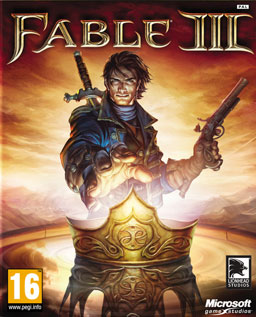 |
| It is immoral to sell this product. |
